Seeking Peace During War
Nancy Jonson Teskey and Mike Teskey BA ’85 help a Ukrainian family flee Kyiv, find refuge, and return home again.
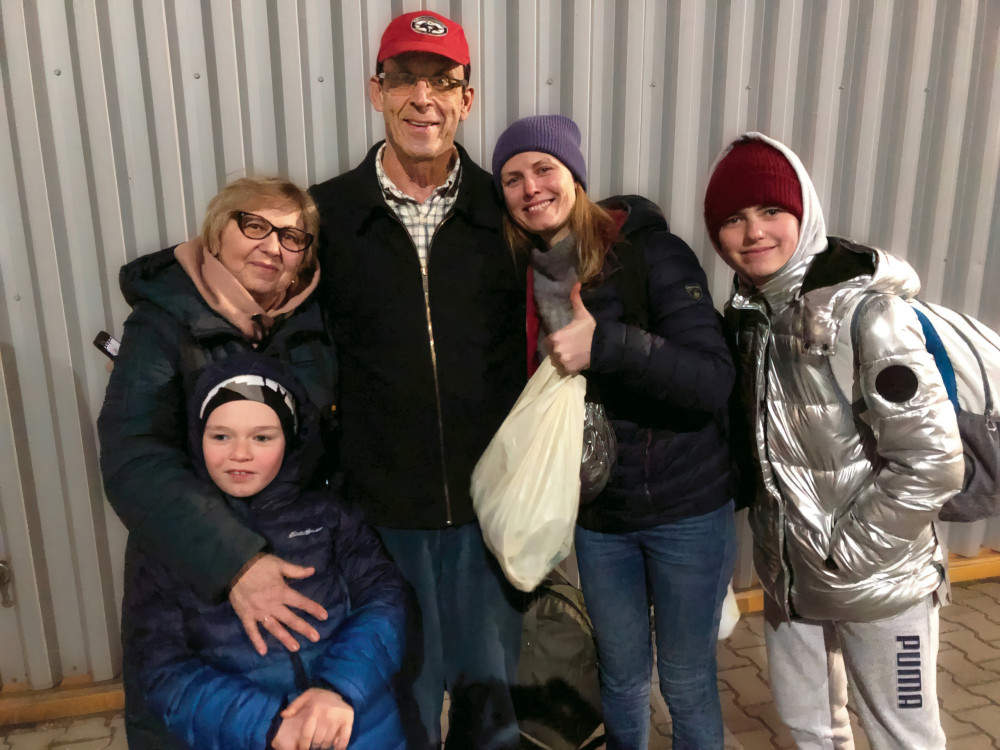
by Angie Jabine
Olga Zakrevska, an English teacher in Kyiv, will never forget February 24, 2022, the day the bombing started. As Vladimir Putin’s army rained down missiles on soldiers and civilians alike, a mass exodus began. Ukrainian President Volodymyr Zelenskyy immediately ordered all men between 18 and 60 to stay in Ukraine and be ready to defend their country against Russia’s so-called “special military operation.”
Olga’s husband, Dima, urged her to leave their apartment and take their two young children, Milana and Bohdan, but she was terrified at the thought. She had just had bunion surgery on February 17; with one foot swollen and the other in a boot, she could barely walk, much less negotiate trains and buses. Finally, late one night when the bombs were especially close, Dima turnedto Olga and said, “You have a mission, and your mission is to save our children.”
Shortly after the war started in late February, Brienne messaged Nancy on Facebook, saying, “Oh my God, you live in Warsaw! My stepmom’s family are in Kyiv, and they’ve got to get out. If they can get to Warsaw, can you help us?”
The story of Olga’s mission began with a slender thread: a connection between a former Lewis & Clark faculty member and her student. Nancy Jonson Teskey, a longtime music instructor at Lewis & Clark, was living in Poland with her husband, Mike Teskey BA ’85, and teaching at the American School of Warsaw. Nancy stays in contact with many of her past students, including Brienne Carpenter BA ’08, who happens to be Olga’s stepsister. Shortly after the war started in late February, Brienne messaged Nancy on Facebook, saying, “Oh my God, you live in Warsaw! My stepmom’s family are in Kyiv, and they’ve got to get out. If they can get to Warsaw, can you help us?”
The Teskeys gladly agreed to meet Olga and her two kids in Warsaw and help in any way they could. Because of Olga’s recent surgery, it was decided that her mother-in-law, Olga Pechinka, would come along to help with the grandchildren. It would be an exhausting and nerve-racking trip—the distance between Kyiv and Warsaw is nearly 500 miles, or what is usually a 15-hour train ride. Millions of mothers and children were making the same journey.
While the two Olgas were preparing to leave Kyiv with Milana and Bohdan, another thread of the story was taking shape in Vancouver, Washington. The children’s maternal grandmother, Nataliya Quandt, was determined to make the trip to Warsaw so she could rendezvous with her daughter and, hopefully, fly her grandchildren to the United States. Nataliya knew it would be comparatively easy to get Milana, age 14, to the U.S. because she still had a valid tourist visa from a previous visit. But she knew securing a first-time visa for Bohdan, age 6, could take much longer. So she brought along her other daughter, Tanya, who also lives in Vancouver. That way each child would have an escort.
Meanwhile, the children’s journey with the “two Olgas” from Kyiv was every bit as anxious as expected. After being turned away from an overbooked train, they were able to board another train headed for Lviv, near Ukraine’s western border. They spent the night there in a borrowed apartment and caught a crowded bus for the long ride to Warsaw the next day.
On March 17, the two Olgas and the children, coming from Kyiv, arrived safely in Warsaw. Nataliya and Tanya, flying from the United States, landed in Warsaw the next day. Mike and Nancy were waiting to meet them all. The family’s relief was palpable. Olga texted: “Today was the deepest sleep we’ve had since 24 February.” Nataliya responded, “After my sleepless nights and constant stress, I can breathe deeply.”
ABC News took note of their journey, too, reporting on the reunited family in a tearful interview that was taped in Mike and Nancy’s Warsaw apartment. In the news segment, the two Olgas clearly are torn, hating the Russian invasion but desperately missing their family members back in Kyiv.
It would be an exhausting and nerve-racking trip—the distance between Kyiv and Warsaw is nearly 500 miles, or what is usually a 15-hour train ride. Millions of mothers and children were making the same journey.
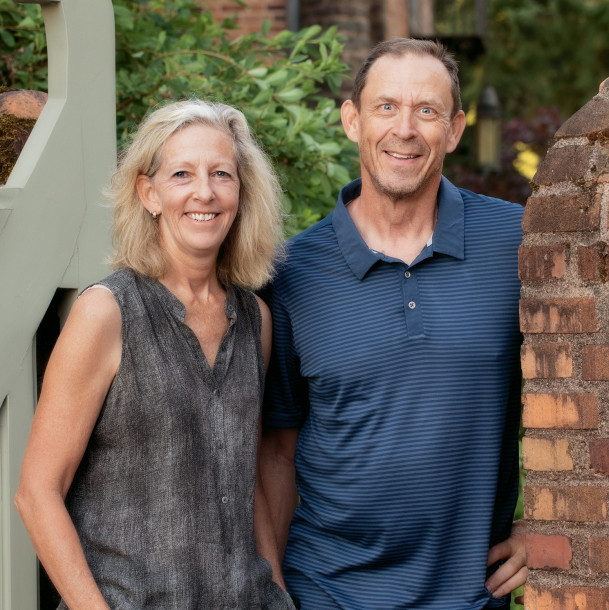
In Another Country: The Teskeys Abroad
Not many couples in their early 50s cast off comfortable careers and a familiar culture so they can start a new working life halfway around the world. But sometimes a life event causes a seismic shift. For Mike and Nancy Teskey, it wasn’t just their two children growing up and moving out that closed the book on their old life. It was Nancy’s breast cancer diagnosis a few years ago.
Says Nancy, “After I got through all my chemo and all those surgeries, we just said, ‘You know what? Life is really short.’ We all have friends who say they’ll travel when they retire, and then they retire, and someone develops Alzheimer’s or breaks a femur or something, and they never do the thing that they’ve saved up their whole life to do. So Mike and I said, ‘Let’s just travel now.’”
But not as retirees. With Nancy’s experience in teaching music and starting music programs, and Mike’s experience in development and alumni relations, first at Lewis & Clark and then at Reed College, they registered their skill sets with Search Associates, a career matchmaking firm connected with international schools around the world. Their first offer: The American International School of Mozambique (AISM), with a student body representing 50 countries. After a quick scouting trip, Mike came back to Portland and told Nancy, “Oh my gosh, this is going to be great!” And it was great, he adds. “Africa got into our blood.”
Sadly, in the middle of their two-year contract in Maputo, COVID-19 made its debut, and in the blink of an eye, AISM lost two-thirds of its students. Knowing her job might well be cut, Nancy went job hunting again and found a music position at the American School of Warsaw, so off they went in the fall of 2021. Mike finished out his Mozambique contract from Warsaw (it’s in the same time zone as Maputo, just several latitudes north). As of June 2022, he is working in development at ASW.
Like so many other members of the L&C community, Mike and Nancy exemplify a sense of interconnectedness with other countries and cultures, a tradition that runs deep at Lewis & Clark. ■
Five days after arriving in Warsaw, big sister Milana was safely on a plane to Vancouver with her aunt Tanya. Mike Teskey, meanwhile, was working to help obtain a U.S. travel visa for Bohdan. Olga had started his application in December 2021 so he too could visit Vancouver, but the paperwork was now stuck in Kyiv. Bohdan would need an in-person interview, as well as notarized photos and documents from his father, to show that the boy was not being kidnapped. In the midst of refugee chaos, the whole process could potentially take many months.
Mike at the time was finishing out his remote work as a development officer with the American International School of Mozambique, where he and Nancy had both worked before their move to Warsaw. In between Zooming with his Mozambique colleagues, Mike was spending hours on hold with American consular and embassy personnel in Poland, trying to expedite Bohdan’s travel visa. It was hectic, to say the least. “If you called Warsaw,” he says, “you ended up getting one of the consular officials who was actually at the Polish/Ukrainian border helping process people with humanitarian issues. So these people were doing double and triple duty.”
Meanwhile others mobilized to help. Brienne Carpenter, who is a lawyer, sought visa advice for her stepsister from immigration expert Christopher Anders, a 2005 Lewis & Clark Law School graduate. She also got help from the office of Congresswoman Jaime Herrera Beutler (R-WA), which succeeded in partially expediting Olga Zakrevska’s I-130 family reunification visa.
(This category of visas is notoriously backlogged; Nataliya first applied for it on Olga’s behalf years ago, and Olga is still waiting for the visa to be issued.)
After many trips to government offices, Bohdan’s temporary visa was secured, and he and his grandmother, Nataliya, were free to fly to the United States. They arrived on April 19. Just a week later, the two children and Nataliya were guests of honor at a Portland Timbers and Thorns charity soccer match to benefit displaced Ukrainians. It was an emotional event for all, with the colors of the Ukrainian flag—blue over yellow, the sky over wheatfields—on full display. With the grandchildren safely in Vancouver, Olga and her mother-in-law had a wrenching decision to make. The war was far from abating, but Kyiv had become comparatively calm. Mother and grandmother were safe in Warsaw, but knowing that young Olga’s husband, Dima, and his brother might be seeing active duty at any time, they also longed to be back in Ukraine.
So on May 15 they boarded an evening train headed for the Ukraine border. “They were traveling through the night with no lights—no interior lights, no cell phones, no headlights. They were trying to avoid being hit by missiles,” says Nancy. Of course, in the dark, a tank parked on the train tracks could be fatal, too. But all went well, and young Olga messaged the Teskeys from Kyiv: “There are so many things to do at work and around the apartment that we don’t have much time for negative thoughts… . Once again, huge thanks for your care and support! We have no way out, just to win and overcome everything. Yeah, viva Ukraine!”
There are so many things to do at work and around the apartment that we don’t have much time for negative thoughts… . Once again, huge thanks for your care and support! We have no way out, just to win and overcome everything. Yeah, viva Ukraine!”
—Olga Zakrevska
Mike and Nancy hasten to say they are just two among the throngs of people assisting Ukrainian refugees. The American School of Warsaw practically transformed itself overnight into a full-service aid organization. Founded in 1953 by U.S. Embassy parents, ASW is an English-language K-12 school for children of all nationalities. Even as classes continued, the staff and parents leaped into action, supplying spare rooms, hotel vouchers, hot meals, clothing, and a safe haven for hundreds, if not thousands, of families pouring west from Ukraine into Poland. That support continues to this day.
Of course, the number of those helped, though impressive, is dwarfed by the millions who have fled. “How will they fare?” asks Nancy. “What if you don’t have friends who are attorneys? What if you don’t have a Mike Teskey who can spend hours each day navigating the U.S. Embassy and checking websites? So these two children, Milana and Bohdan, won the lottery, right? Not because we’re heroes but because we’re educated and we’re connected. What about the people who aren’t?”
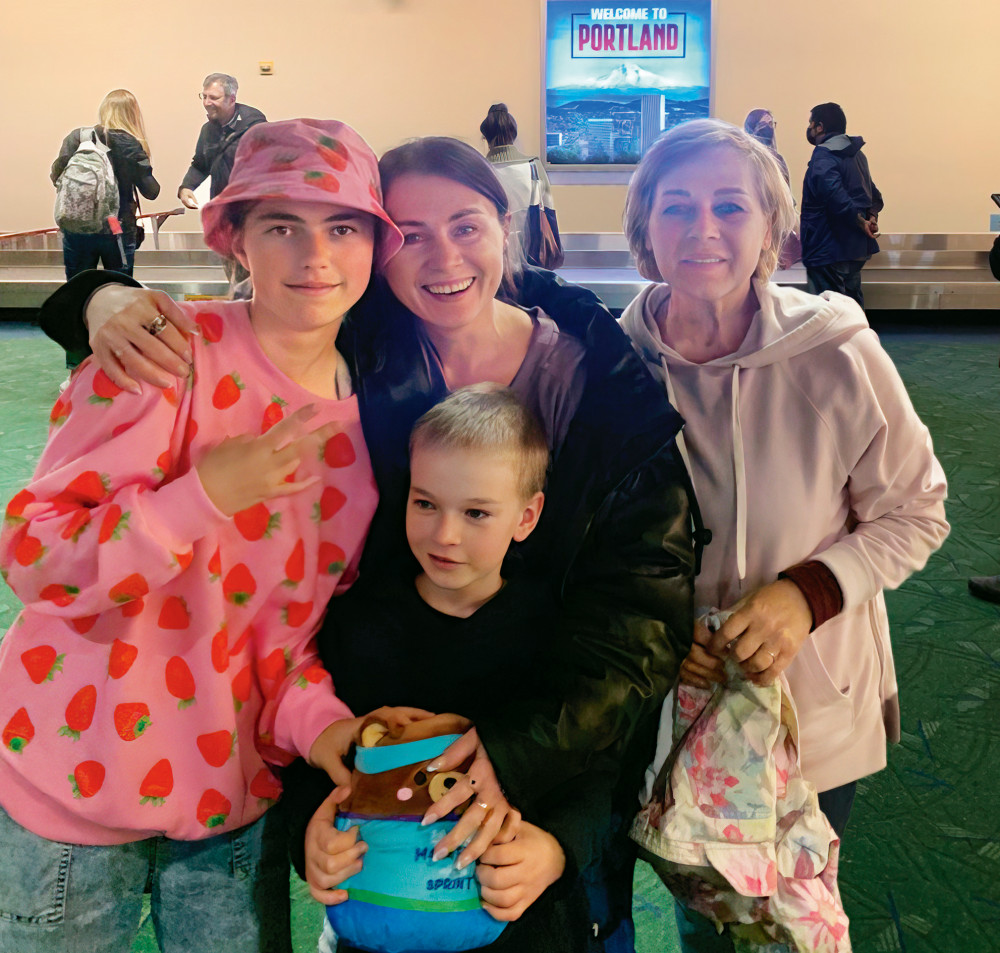
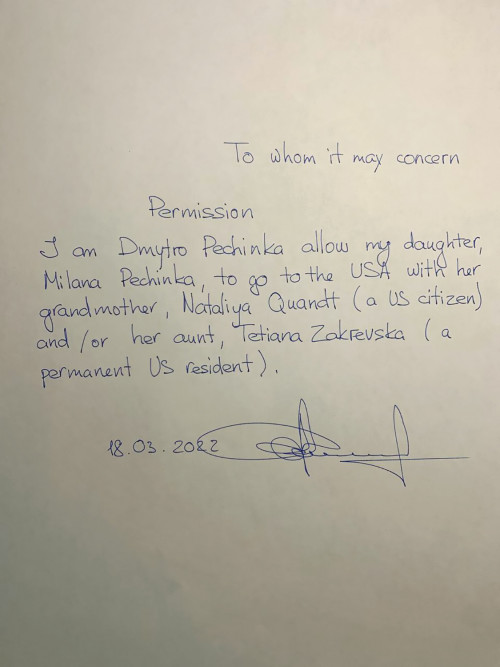
This fall, the children, who had been staying in Vancouver with their grandmother, decided to return home to Ukraine. They had enjoyed their stay, but they missed their parents, and school was starting back home. Besides, their travel visas were expiring. So, accompanied by their aunt Tanya, they flew back to Warsaw, where the Teskeys were waiting to put the children on a train to Kyiv. They arrived home safely on September 9.
As of mid-October, the family is pursuing an expedited humanitarian parole visa so they can relocate to Vancouver. The parole period is just two years, but it would enable them to escape the war zone for that time.
As Nataliya says, “Our family’s painful journey is still ongoing.” Much like the Russia-Ukraine war. ■
Angie Jabine is a Portland-based writer and editor.
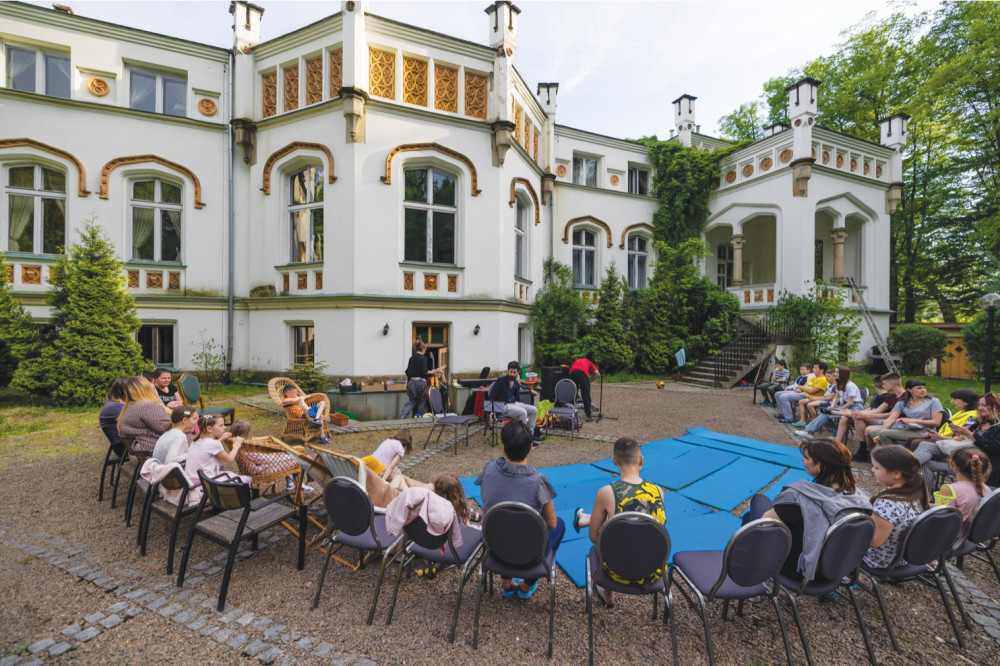
A Polish Palace for Ukrainian Refugees
Denver human rights advocate and restaurateur Michael Graham BA ’05 has been described as someone who “runs toward crises as they’re unfolding.” Having worked on humanitarian projects in Afghanistan, Congo, Sudan, and Rwanda—as well as a COVID-driven emergency food network in Denver— Graham was swift to recognize that Ukrainian refugees would desperately need shelter.
His quick internet search of Polish vacation rentals turned up a perfect place: the Paszkowka Palace outside Krakow. Owner Jan Oleksy was amenable to leasing out the entire space to house Ukrainians. Graham then turned to his friend Landon Mascareñaz BA ’05 (they were college roommates) to help secure funding from a wide array of partners, including musician Gregory Alan Isakov, Mandy Patinkin, and the First Baptist Church of Denver, raising about $20,000.
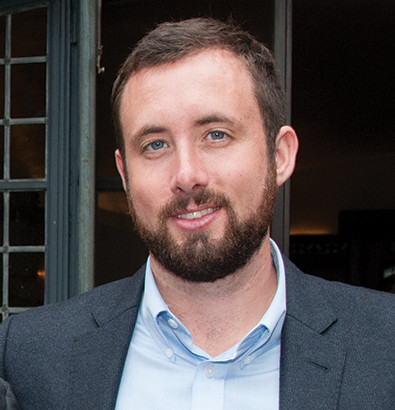
“This project has been easier than some,” says Graham. “The owner was amenable to renting out the entire space, and we were able to find a Polish partner easily. But fundraising has been challenging. I think people are a little tapped out, not just with what’s going on there, but also domestically.” Still, the coalition is forging ahead.
To learn more about Palaces for People, visit palacesforpeople.org; the website, incidentally, received assistance from Rwanda-born Romeo Umulisa, who was Lewis & Clark’s first Dallaire scholar. The Dallaire Scholarship enables recipients to enroll in the Academic English Studies (AES) program at L&C for one academic year.
On a related note, the college offers a similar scholarship for Portland-area high school graduates who are refugees or immigrants and are non-native English speakers. Appropriately, the scholarship is named for Michael Graham. ■
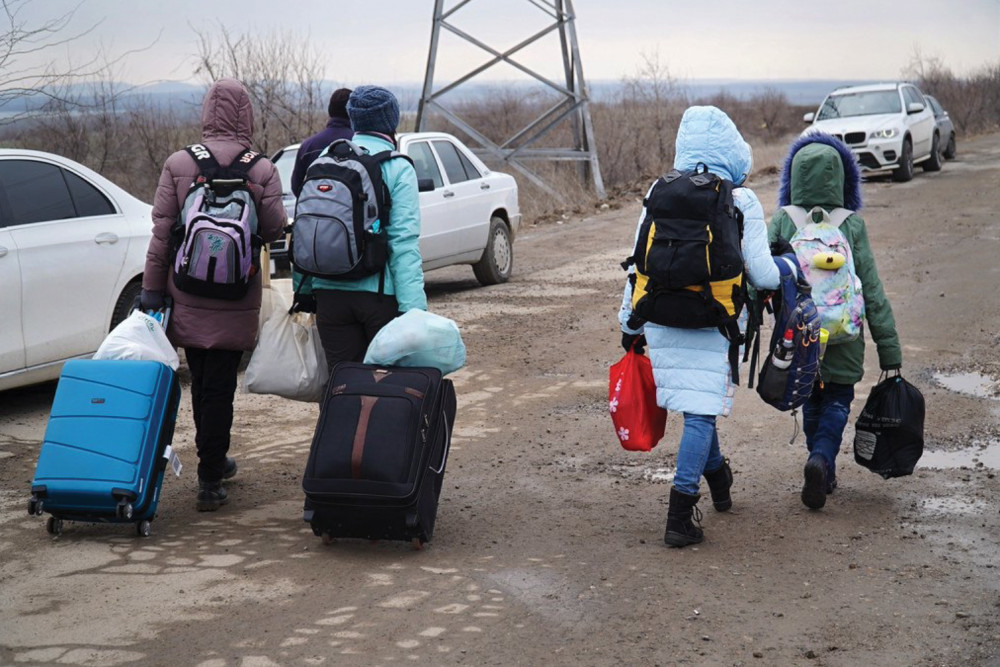
More L&C Magazine Stories
Lewis & Clark Magazine is located in McAfee on the Undergraduate Campus.
MSC: 19
email magazine@lclark.edu
voice 503-768-7970
fax 503-768-7969
The L&C Magazine staff welcomes letters and emails from readers about topics covered in the magazine. Correspondence must include your name and location and may be edited.
Lewis & Clark Magazine
Lewis & Clark
615 S. Palatine Hill Road MSC 19
Portland OR 97219

